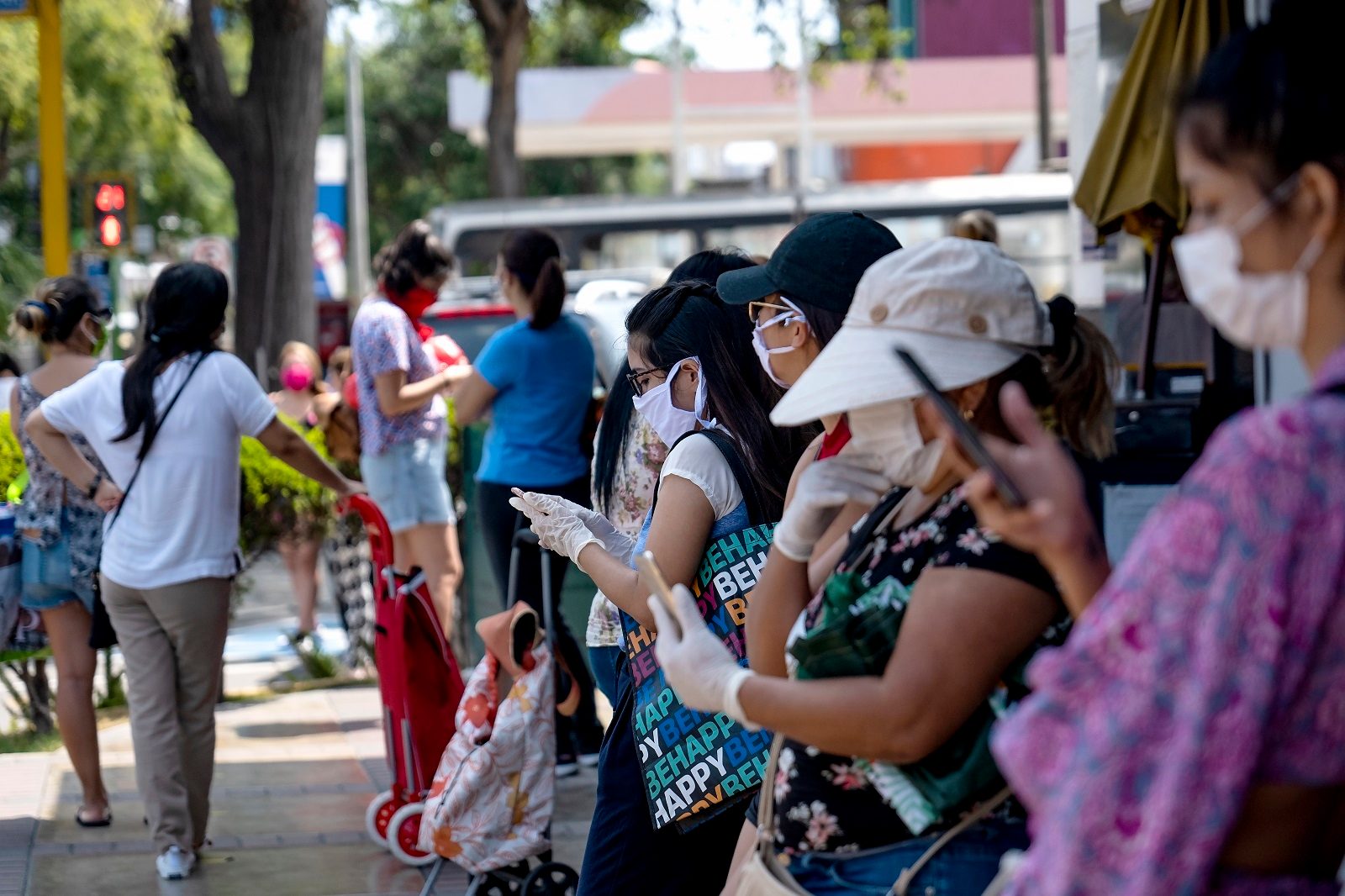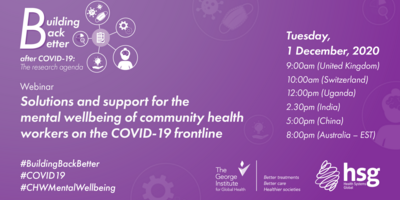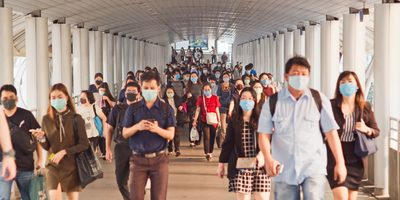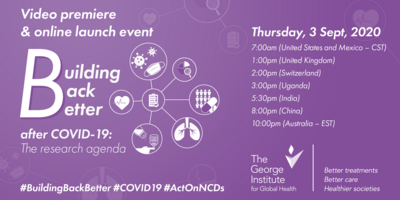
Highlights from the ‘Building back better after COVID-19: The research agenda’ launch event
On 3 September 2020, The George Institute hosted a virtual video premiere and panel discussion (watch here) to identify key intersections between the COVID-19 pandemic and non-communicable diseases (NCDs), and the evidence gaps we urgently need to tackle in order to ‘build back better’.
The event, which was attended by participants from every continent across 36 countries (including Bangladesh, Barbados, Brazil, Belgium, Burundi, Canada, France, Hong Kong, Kenya, Mexico, Norway and UAE) opened with the screening of a video showcasing the views of academics, advocates, research funders and policymakers around the world. The screening was followed by a compelling discussion with a similarly global panel on what we’ve learned from the pandemic, and the NCD research priorities that are emerging as a consequence.
For more information about the Building Back Better initiative click here.

The discussion was chaired by The George Institute's Chief Scientist, Professor Anushka Patel, and featured experts Gene Bukhman (Director of NCD Synergies at Partners in Health and Co-Chair of the Lancet NCDI Poverty Commission); Katie Dain (CEO of NCD Alliance); Olive Kobusingye (Senior Research Fellow at Makere University School of Public Health, Kampala); Bente Mikkelsen (Director of WHO’s Department for NCDs); Juan Angel Rivera Dommarco (General Director of the National Institute of Public Health in Mexico); and Rajani Ved (Executive Director of National Health Systems Resource Centre, India).
Professor Patel kicked off the discussion by asking: Are you concerned or optimistic about the place of NCDs on the global research agenda in light of the COVID-19 pandemic?
In general, our panellists were optimistic. While Dr Bente Mikkelsen made the point that NCDs have been largely absent from the research agenda for COVID-19, she conceded that the pandemic represents "a golden opportunity" for NCD researchers to prioritise their agenda. Other panellists were more optimistic, arguing that the increased vulnerability of people living with NCDs to COVID-19 had generated welcome interest in chronic diseases, which are often neglected.
In contrast, the majority of audience members felt concerned, with 132 audience members responding to a poll during the conversation:

The discussion that followed focused on the question ‘What is the most pressing issue for the global NCD research agenda if we are to build back better after COVID-19?’, with a number of key themes emerging:
The need to ensure the voices of communities and people living with NCDs are at the centre of the pandemic research response
One of the key themes that emerged during the conversation concerned how we can better ensure those living with NCDs are at the centre of decisions, whether determining the research agenda or choosing which health services to provide. Governments around the world dealt with COVID-19 in "a very fast and urgent way, at the expense of actually engaging patients and the public in many contexts," noted panellist Katie Dain.
Global efforts to build back better after COVID must be centred on inputs received from people living with NCDs and reflect their experiences; this includes decisions around "what kind of NCD services should be part of an essential universal health coverage benefit package," argued Dr Mikkelsen.
Video contributor and advocate with the Uruguayan Diabetes Association, Bruno Carrattini, shared the following in the event chat: "The new health systems strengthening processes due to the COVID-19 pandemic should integrate the perception of care (that) people living with NCDs. QUALITATIVE INVESTIGATION and research that is often overlooked should be considered when trying to create a universal coverage and primary care system to serve NCDs".
Related to this is the need to think about how we can alter our current global economic system to one that has people and health at its heart. As panellist Dr Juan Angel Rivera Dommarco noted, we need to understand:
"How can we transform our economy so that at the same time it contributes to health?"
The need to understand how we can strengthen health systems and address inequities in access to NCD services
Another key theme that emerged during the event was the need to address the weaknesses the pandemic has exposed in health systems, particularly in terms of essential health services. Dr Mikkelsen highlighted a WHO survey that revealed massive disruption to NCD services globally, and emphasised the importance of primary health care for managing NCDs among people in all communities.
COVID-19 has exposed huge inequities in access to NCD services, particularly in the poorest countries. Dr Mikkelsen noted that "NCDs are the biggest killer; 16 million people die prematurely [each year], and it is really low income countries that are affected." Dr Gene Bukhman described NCD services as almost non-existent for those in low income countries. "I think we’re at a situation where, for most people with NCDs in the poorest countries, their biggest issue isn’t the disruption of NCD services, because there really are no NCD services to any great degree," he said.
Meanwhile, Dr Rajani Ved argued that while COVID-19 has advanced several innovations in telehealth and telemedicine, we need careful research from an equity point of view into the impacts of these innovations, as "telehealth and telemedicine, certainly in internet dark areas, are not accessible to people."
Participant Katherine Pettus echoed the need for an equity lens and focus on the community level:
"Research should address what mechanisms must be developed so health systems can most effectively integrate palliative care and adequate access to essential palliative care medicines into primary health care at the community level to care for people with NCDs as well as in the COVID response for building back better."
The need for research that breaks down health silos
Another theme central to the Building Back Better discussion was an idea put forward by Professor Patel: "The COVID-19 pandemic has highlighted the pressing need to move away from parallel disease responses."
The pandemic response, whilst initially focused solely on prevention, later highlighted the importance of treating those with underlying health conditions – primarily NCDs - due to the greater susceptibility of these patients to COVID-19. "You can’t really talk about COVID-19 without talking about NCDs," noted panellist Katie Dain.
It is this deadly combination of a pre-existing NCD, such as obesity, diabetes or cancer, in conjunction with COVID-19, that has brought more global attention to the burden of NCDs. In turn, this attention has led to increased recognition of the need to break down current health silos, in particular between infectious and chronic diseases, and undertake inter-disciplinary research.
This need is underscored by increasing evidence emerging on the debilitating, long-term impacts some people experience following infection with COVID-19, including damage to the heart, respiratory system and kidneys. As Katie Dain said,
"COVID-19 could be really fuelling a huge number of new people with NCDs around the world."
The panel also noted the urgent need for more research to understand multi-morbidity - the presence of two or more long-term health conditions. "One study shows that between 13 and 95% of patients globally are affected by multi-morbidity," Katie said, with the huge range of the estimate starkly highlighting the lack of understanding of the issue.
Panellist Olive Kobusingye highlighted the need for research focused on the intersections between the COVID-19 pandemic, transport and equity. Specifically referring to low- and middle-income countries that have "without exception, crowded public transportation", Dr Kobusingye highlighted that many pedestrians "either risk being injured or killed on the roads, or they must use very crowded public transportation and rick contracting the virus." Dr Kobusingye called for more research to be done ‘to answer questions such as “What is safe public transport?”’.
Priorities in NCD research
During the conversation, participants were asked to choose which of the following they would prioritise in NCD research: reducing inequities; developing meaningful community engagement; or breaking down health silos. The results showed that while all three options are considered important, ‘reducing inequities’ is the most pressing issue for the global NCD research agenda right now.

We asked the same question on Twitter and received a similar response:

The interactive discussion evidenced a clear consensus around the crucial role of research in building back better, as noted by Chief Executive Officer of the Global Alliance for Chronic Diseases, Morven Roberts, in the video premiered:

Get involved
This online event was the first activity in a new initiative from TGI, ‘Building Back Better after COVID-19: The Research Agenda’, which will develop analyses and outputs highlighting different aspects of the intersection of the pandemic with NCDs and key evidence gaps. More information and details of future events can be found here
Watch the event recording here:




